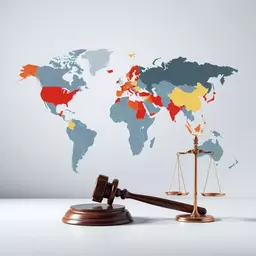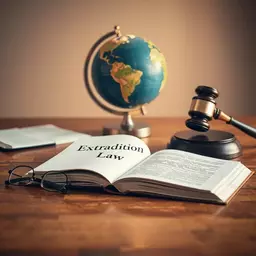Guide to Extradition Defense Strategies

Extradition is often viewed as a complex and intimidating legal process, yet understanding its fundamentals can significantly empower individuals facing its implications. With international laws always evolving, clear knowledge of extradition can mean the difference between freedom and legal entanglement.
What You Will Learn
- Extradition is a legal procedure for returning individuals accused of crimes back to their home countries.
- The extradition process involves a formal request, review of documentation, legal hearings, and a final decision influenced by various factors.
- Understanding the difference between bilateral and multilateral extradition is crucial, as it impacts the legal strategies applicable to your case.
- Extradition treaties are essential, defining the crimes eligible for extradition and ensuring the rights of the accused are protected.
- Preparation for extradition hearings requires meticulous planning, including gathering important documents and consulting with specialized attorneys.
- Jurisdiction plays a critical role in the extradition process, influencing the applicable laws and potential defenses available.
- The emotional impact of facing extradition should not be overlooked; seeking mental health support and community resources can be beneficial.
- Learning from real-life case studies can provide insights into effective defense strategies and common pitfalls to avoid.
Overview of the Extradition Process
The following visual representation outlines the key steps involved in the extradition process, highlighting the distinctions between bilateral and multilateral extradition. For those seeking expert legal counsel, especially regarding complex international legal matters, it's beneficial to consult with criminal defense lawyers in Dubai who specialize in this field.
Bilateral Extradition
- Involves a direct agreement between two nations.
- Typically governed by specific treaties.
- Allows for the return of individuals accused of crimes directly.
Multilateral Extradition
- Involves multiple countries through broader agreements.
- Facilitated by international treaties.
- Enables collaboration on international crimes.
Key Steps in the Extradition Process
- Request for extradition submitted by the originating country.
- Review of documentation and applicable treaties.
- Legal hearings in the requested country.
- Final decision made regarding extradition.
Timeline Overview
- Issuance of the extradition request.
- Review by local authorities and initial hearings.
- Possible appeals and legal challenges.
- Final decision on extradition.
Understanding Extradition: Key Concepts and Definitions
Extradition can seem daunting, but it’s important to grasp the basics. What exactly is extradition? In simple terms, it’s the legal process where one country hands over a person to another country to face criminal charges. This typically occurs when an individual has committed a crime in one nation but is found in another. The intricacies of this process can vary greatly depending on the countries involved and their respective laws.
Understanding these processes can empower those facing potential extradition. At Extradition Interpol UAE, I strive to provide clarity on the complex legal frameworks that govern these matters. Knowledge is essential, whether you’re a legal professional or an individual caught in the web of international law.
The Extradition Process Explained
Let’s break down the extradition process into more manageable parts. First, a request for extradition is made, usually by the government of the country where the crime occurred. This request includes important documents and evidence against the individual. Next, the requested country assesses this request to ensure it adheres to local laws and any existing treaties.
Ultimately, the decision can be influenced by several factors, including the severity of the crime, the presence of an extradition treaty, and whether the individual’s rights would be protected. Here’s a quick overview of the primary steps in the extradition process:
- Request for extradition submitted by the originating country.
- Review of documentation and applicable treaties.
- Legal hearings in the requested country.
- Final decision made regarding extradition.
What is Extradition?
As I mentioned earlier, extradition is a legal procedure aimed at returning someone accused of a crime back to the requesting country. This process is often guided by treaties that define the specific terms under which extradition can occur. It’s worth noting that not all countries have extradition treaties with one another, which can complicate matters. For instance, if someone is in a non-extradition country, they might evade capture, but that doesn’t necessarily mean they are free from legal consequences.
Understanding these definitions can help individuals comprehend their situations better. Knowing what extradition means can help you evaluate your legal options. If you ever find yourself in a predicament, seeking expert advice is crucial. For a deeper dive into how these processes operate, particularly in the UAE, explore more about extradition laws in the UAE.
Types of Extradition: Bilateral vs. Multilateral
Extradition can be categorized into two main types: bilateral and multilateral. Bilateral extradition occurs between two countries, guided by a specific treaty that outlines the terms of extradition. On the other hand, multilateral extradition involves several countries, often facilitated by international agreements. Each type has its implications and processes, which can significantly affect how cases are handled.
- Bilateral Extradition: Involves a direct agreement between two nations.
- Multilateral Extradition: Involves multiple nations, typically under a broader treaty.
Understanding whether your case falls under bilateral or multilateral extradition can help clarify the steps you need to take. It’s also essential to be aware of the treaties your country has in place, as this will impact the legal strategies available to you.
Extradition Treaty: Importance and Implications
Extradition treaties are crucial because they establish the legal grounds for extradition requests. These documents outline what crimes are extraditable and ensure that both countries follow agreed-upon legal standards. Without such treaties, extradition can become much more complex and may not occur at all.
Knowing the implications of these treaties can significantly influence your case. For instance, if you are facing extradition, understanding the treaty in place between the countries involved can provide insights into potential legal defenses. Here are a few key points regarding extradition treaties:
- Define the crimes eligible for extradition.
- Establish safeguards for the rights of the accused.
- Outline mutual legal assistance procedures.
Legal Framework Governing Extradition
The legal framework surrounding extradition is often intricate and varies from one jurisdiction to another. It includes national laws, international treaties, and customary international law. Understanding this framework is vital for those facing extradition, as it dictates not only the process but also the possible defenses available.
It’s essential to consult legal experts who specialize in extradition law. These professionals can navigate the complexities involved, ensuring that your rights are protected throughout the process. At Extradition Interpol UAE, I aim to shine a light on these legal intricacies, empowering individuals with the knowledge they need to confront their extradition challenges.
Quick Summary
Here's a brief recap of the key points discussed so far:
- Extradition is the legal process of handing over an individual to face charges in another country.
- The extradition process involves a request from the country where the crime occurred and a review by the requested country.
- Extradition treaties are essential as they define the terms and conditions under which extradition can occur.
- Understanding the types of extradition—bilateral and multilateral—can clarify the legal strategies available.
Frequently Asked Questions About Extradition
- What is extradition?
- Extradition is the legal process by which one country formally hands over an individual accused or convicted of a crime to another country where they are wanted for prosecution or to serve a sentence.
- What is the difference between bilateral and multilateral extradition?
- Bilateral extradition occurs between two countries, typically governed by a specific treaty. Multilateral extradition involves multiple countries, often under broader international agreements or conventions.
- Why are extradition treaties important?
- Extradition treaties are crucial as they establish the legal framework, define extraditable offenses, and outline the procedures and safeguards for the rights of the accused between participating countries.
- Can I fight an extradition request?
- Yes, it is possible to fight an extradition request. This often involves legal hearings where defenses such as political offense, double jeopardy, or concerns about human rights can be raised. Seeking expert legal advice is essential.
- What role does jurisdiction play in extradition cases?
- Jurisdiction determines which country's laws apply and where the legal proceedings will take place. It influences the applicable laws, the specific process, and the potential defenses available to the accused.
Practical Guidance for Those Facing Extradition
Facing the possibility of extradition can be overwhelming, but understanding the process can help ease some of that anxiety. At Extradition Interpol UAE, we strive to empower individuals with practical knowledge and strategies tailored to navigate these complex situations. Let’s dive into a step-by-step guide that can prepare you for extradition hearings and offer clarity during this challenging time.
Step-by-Step Guide to Preparing for Extradition Hearings
Preparation is key when it comes to extradition hearings. Having a solid plan can significantly impact the outcome. Here’s a checklist to guide you through the preparation process:
- Gather all relevant documents, including identification, legal documents, and any correspondence related to the extradition request.
- Consult with a specialized attorney who understands the intricacies of international law and can represent your interests effectively.
- Prepare a statement outlining your position and any potential defenses you wish to present.
- Review the legal framework governing your case and understand the treaties involved.
Checklist for Document Preparation
When preparing documents for your case, organization is crucial. Here’s a useful checklist to ensure you have everything in order:
- Identification documents (passport, national ID).
- Legal representation agreement.
- Evidence supporting your case (witness statements, expert opinions).
- Any previous legal documents related to the extradition.
Timeline of the Extradition Process
Understanding the timeline can help set realistic expectations. While every case is different, here’s a general overview of what to anticipate:
- Issuance of the extradition request.
- Review by local authorities and initial hearings.
- Possible appeals and legal challenges.
- Final decision on extradition.
Understanding Jurisdiction in Extradition Cases
Jurisdiction plays a critical role in extradition cases. It's essential to know where the legal proceedings will take place, as this influences the applicable laws and defenses. Every country has its own jurisdictional rules, which can affect how an extradition request is processed. If you're feeling uncertain about which jurisdiction applies to your situation, consulting a legal expert like those at Extradition Interpol UAE can provide the guidance you need! For comprehensive insights into defending against such requests, consider exploring defense strategies for extradition cases.
Addressing Common Concerns and FAQs about Extradition Defense
If you or someone you know is facing extradition, it's natural to have many questions and concerns. Here, I’ll tackle some common issues and provide insights to help ease your mind.
What Should You Know Before Challenging Extradition?
Before taking steps to challenge an extradition request, it’s vital to understand the potential implications and emotional impact. The process can be stressful, and the psychological toll shouldn't be overlooked. Here are some things to consider:
- Seek support from mental health professionals to manage stress and anxiety.
- Stay informed about your legal rights and options.
- Reach out to support groups or individuals who have faced similar challenges for advice and encouragement.
Psychological Impact on Defendants and Support Resources
The emotional strain of facing extradition can be significant. It’s important to prioritize your mental health during this time. Remember, you’re not alone, and various resources are available to help you cope. Engaging with mental health professionals and connecting with support networks can foster resilience and provide a safe space to share your experiences.
Expert Commentary and Case Studies: Learning from Real Experiences
Learning from others can be invaluable. Analyzing successful defense strategies and understanding common pitfalls can guide your approach. Reflecting on real-life cases can also demystify the process, illustrating how others navigated their challenges:
- Case studies of individuals who successfully contested extradition, highlighting effective legal arguments.
- Common mistakes made in extradition cases and how to avoid them.
- Insights on the judicial review process and what to expect if your case goes to appeal.
Illustrating Successful Defense Strategies
Many individuals have successfully challenged extradition requests by utilizing various strategies. Key elements often include leveraging constitutional rights, highlighting procedural flaws, and presenting substantial evidence. Each case is unique, but learning from these experiences can empower you or someone you know to build a strong defense. For a deeper understanding of such scenarios, it's worth reviewing extradition cases shaping UAE law.
Common Pitfalls in Extradition Cases
It’s essential to be aware of the common pitfalls that can affect extradition cases. Failing to meet documentation requirements or missing crucial deadlines can have significant consequences. Staying informed and proactive is vital, and working closely with legal professionals can help avoid these missteps.
Judicial Review and the Appeals Process in Extradition
If a decision is made against you, understanding the judicial review process is critical. This process allows for the examination of the legality of the extradition decision and can often provide an opportunity for a fresh evaluation of your case. Engaging with a knowledgeable attorney can guide you through this complexity and help protect your rights.
Summarizing Key Takeaways and Next Steps
As we conclude this section, remember that tackling extradition challenges requires a thorough understanding of your rights and options. Legal defenses are available, but it’s crucial to seek guidance early. If you or someone you know is facing extradition, I encourage you to connect with a professional legal team at Extradition Interpol UAE. Together, we can navigate this intricate landscape and work towards the best possible outcome!
Recap of Legal Defenses and Strategies Against Extradition
In summary, being prepared and informed is your best defense. Understanding the process, recognizing your rights, and seeking professional advice can significantly impact your experience. Each step taken is one closer to securing the justice you deserve. For more advanced strategies and an in-depth look at how various elements of international law intersect, consider exploring articles on Interpol's influence on extradition processes.
Encouragement to Seek Professional Legal Assistance
Navigating the complexities of extradition law can feel daunting, but you don't have to face it alone. Seeking expert legal assistance is crucial. At Extradition Interpol UAE, we are committed to providing you with the insights and support you need. Don’t hesitate to reach out and take the first step towards your defense!
Recap of Key Points
Here is a quick recap of the important points discussed in the article:
- Extradition is the legal process of surrendering an individual from one country to another to face criminal charges.
- The extradition process involves a formal request, review of documentation, legal hearings, and a final decision.
- Extradition can be bilateral (between two countries) or multilateral (involving multiple countries), each with specific treaties and rules.
- Extradition treaties establish the grounds for extradition and protect the rights of the accused.
- Thorough preparation for extradition hearings includes gathering documents, consulting legal experts, and understanding applicable treaties.
- Jurisdiction plays a critical role in extradition cases, affecting the applicable laws and possible defenses.
- Emotional support and mental health resources are essential for individuals facing extradition to manage stress and anxiety.
- Learning from case studies and common pitfalls can help individuals navigate the extradition process more effectively.



